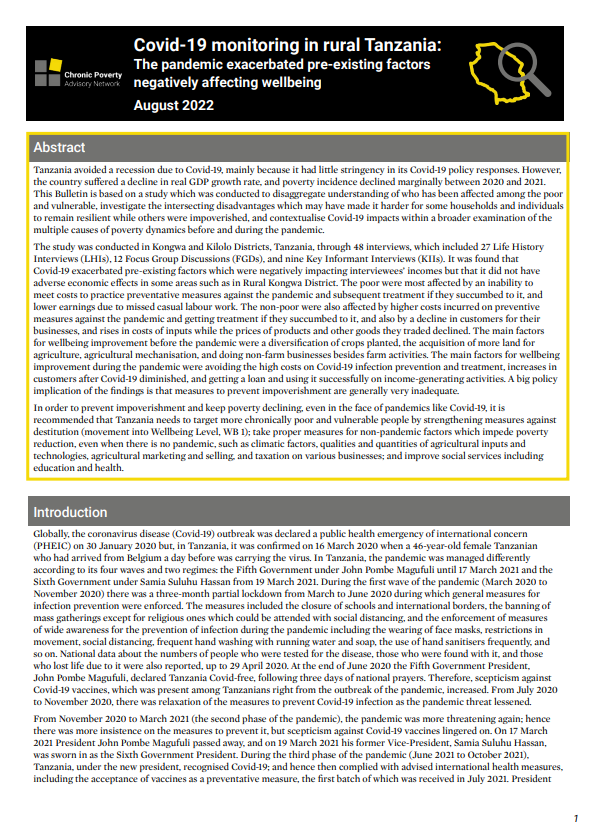Tanzania avoided a recession due to Covid-19, mainly because it had little stringency in its Covid-19 policy responses. However, the country suffered a decline in real GDP growth rate, and poverty incidence declined marginally between 2020 and 2021. This Bulletin is based on a study which was conducted to disaggregate understanding of who has been affected among the poor and vulnerable, investigate the intersecting disadvantages which may have made it harder for some households and individuals to remain resilient while others were impoverished, and contextualise Covid-19 impacts within a broader examination of the multiple causes of poverty dynamics before and during the pandemic.
The study was conducted in Kongwa and Kilolo Districts, Tanzania, through 48 interviews, which included 27 Life History Interviews (LHIs), 12 Focus Group Discussions (FGDs), and nine Key Informant Interviews (KIIs). It was found that Covid-19 exacerbated pre-existing factors which were negatively impacting interviewees’ incomes but that it did not have adverse economic effects in some areas such as in Rural Kongwa District.
The poor were most affected by an inability to meet costs to practice preventative measures against the pandemic and subsequent treatment if they succumbed to it, and lower earnings due to missed casual labour work. The non-poor were also affected by higher costs incurred on preventive measures against the pandemic and getting treatment if they succumbed to it, and also by a decline in customers for their businesses, and rises in costs of inputs while the prices of products and other goods they traded declined. The main factors for wellbeing improvement before the pandemic were a diversification of crops planted, the acquisition of more land for agriculture, agricultural mechanisation, and doing non-farm businesses besides farm activities. The main factors for wellbeing improvement during the pandemic were avoiding the high costs on Covid-19 infection prevention and treatment, increases in customers after Covid-19 diminished, and getting a loan and using it successfully on income-generating activities. A big policy implication of the findings is that measures to prevent impoverishment are generally very inadequate.
In order to prevent impoverishment and keep poverty declining, even in the face of pandemics like Covid-19, it is recommended that Tanzania needs to target more chronically poor and vulnerable people by strengthening measures against destitution (movement into Wellbeing Level, WB 1); take proper measures for non-pandemic factors which impede poverty reduction, even when there is no pandemic, such as climatic factors, qualities and quantities of agricultural inputs and technologies, agricultural marketing and selling, and taxation on various businesses; and improve social services including education and health.
Authors: Lucia da Corta, Kim Abel Kayunze, Judith Samwel Kahamba, Constantine George Simba, Andrew Shepherd, and Halima Omari Mangi

